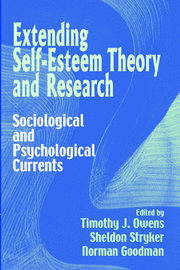Book contents
- Frontmatter
- Contents
- List of Contributors
- SECTION ONE THE FRAME
- SECTION TWO CONCEPTUAL AND METHODOLOGICAL ISSUES
- SECTION THREE SOCIAL AND LIFE COURSE CONTEXTS OF SELF-ESTEEM
- SECTION FOUR SELF-ESTEEM AND SOCIAL INEQUALITIES
- 11 Self-Esteem and Race
- 12 Gender and Self-Esteem: Narrative and Efficacy in the Negotiation of Structural Factors
- 13 Bereavement and the Loss of Mattering
- 14 Self-Esteem and Social Inequality
- 15 Self-Evaluation and Stratification Beliefs
- SECTION FIVE SELF-ESTEEM AND SOCIAL PROBLEMS
- Index
15 - Self-Evaluation and Stratification Beliefs
Published online by Cambridge University Press: 24 November 2009
- Frontmatter
- Contents
- List of Contributors
- SECTION ONE THE FRAME
- SECTION TWO CONCEPTUAL AND METHODOLOGICAL ISSUES
- SECTION THREE SOCIAL AND LIFE COURSE CONTEXTS OF SELF-ESTEEM
- SECTION FOUR SELF-ESTEEM AND SOCIAL INEQUALITIES
- 11 Self-Esteem and Race
- 12 Gender and Self-Esteem: Narrative and Efficacy in the Negotiation of Structural Factors
- 13 Bereavement and the Loss of Mattering
- 14 Self-Esteem and Social Inequality
- 15 Self-Evaluation and Stratification Beliefs
- SECTION FIVE SELF-ESTEEM AND SOCIAL PROBLEMS
- Index
Summary
It is my thesis that attitudes toward equality rest in the first instance upon one's attitude towards one's own status. Like a large number of social beliefs, attitudes towards equality take their direction from beliefs about the self, the status of the self, one's self-esteem or lack thereof.
(Lane, 1959, p. 37)INTRODUCTION
This study explores relationships between self-evaluation (i.e., self-esteem and mastery) and ideological beliefs about the causes of poverty (i.e., “stratification beliefs” or “stratification ideology”). While there has been a good deal of research into the antecedents and consequences of self-concept variables (Gecas & Burke, 1995; Rosenberg, 1979, 1981) and stratification beliefs (Kluegel & Smith, 1986), scant theoretical or empirical research has focused on relationships between these two phenomena. This study addresses this gap in the social psychological literature by examining relationships between self-evaluation and “individualistic” and “structuralist” beliefs about the causes of poverty (Feagin, 1972, 1975; Kluegel & Smith, 1986). In addition, self-evaluation/stratification beliefs relationships are examined separately for African Americans, Latinos, and whites, in an effort to critically examine an “assumption of race/ethnic similarity” regarding social psychological processes (Hunt et al., 2000).
Three basic research questions guide this study: (1) Are there relationships between self-evaluation and stratification beliefs? (2) Do any such relationships exist net of the effects of race and other sociodemographic variables? (3) Do African Americans, Latinos, and whites differ in relationships between self-evaluation and stratification beliefs? I answer these questions using a sample of southern Californians (n = 2,628) collected in 1993.
Information
- Type
- Chapter
- Information
- Extending Self-Esteem Theory and ResearchSociological and Psychological Currents, pp. 330 - 350Publisher: Cambridge University PressPrint publication year: 2001
Accessibility standard: Unknown
Why this information is here
This section outlines the accessibility features of this content - including support for screen readers, full keyboard navigation and high-contrast display options. This may not be relevant for you.Accessibility Information
- 5
- Cited by
